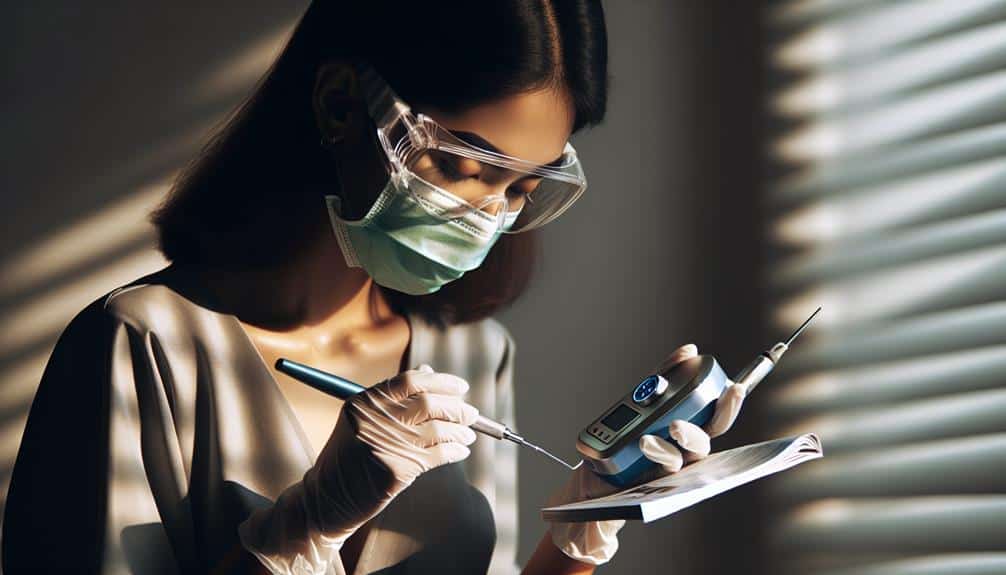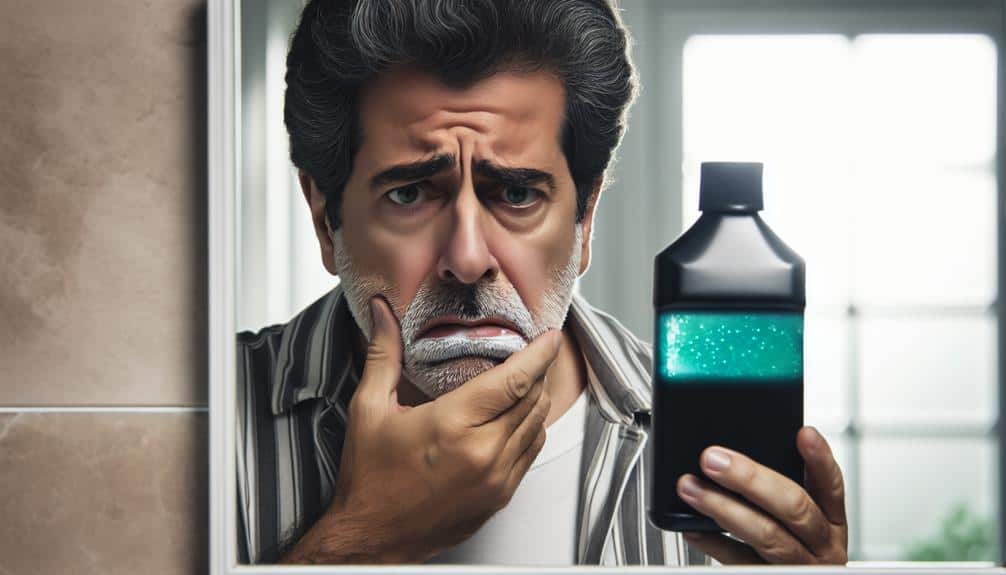To minimize risks while whitening your teeth at home, closely follow the instructions on any DIY kits to prevent enamel damage and increased sensitivity. Enamel damage can lead to heightened tooth sensitivity and cavity risks, so it is crucial to use the whitening solutions correctly and avoid prolonged exposure. If you experience any pain or sensitivity, discontinue use and seek advice from a dentist promptly. Using products specifically designed for sensitive teeth can help reduce the impact of harsh chemicals.
Remember, safeguarding your enamel is vital to prevent discomfort. Seek further guidance from dental professionals for personalized whitening recommendations and to guarantee the safety of your teeth and gums.
Key Points
- Follow instructions carefully to prevent enamel damage and sensitivity.
- Use products designed for sensitive teeth to minimize discomfort.
- Address existing dental issues like cavities and gum disease before whitening.
- Avoid overusing whitening products to prevent enamel erosion and gum irritation.
- Consult a dental professional for personalized advice and safe whitening practices.
Potential Risks of DIY Whitening Kits
When using DIY whitening kits at home, it's important to be aware of the potential risks they may pose to your oral health. While these kits can provide a convenient way to enhance the whiteness of your teeth, improper use can lead to significant issues. One of the primary concerns is the risk of enamel damage. The whitening agents in these kits, if not used correctly, can weaken the enamel, which is the protective outer layer of your teeth. Enamel damage can make your teeth more sensitive to hot or cold temperatures and increase the likelihood of cavities and other oral health problems.
To prevent enamel damage and protect your oral health when using DIY whitening kits, it's essential to carefully follow the instructions provided. Avoid leaving the whitening solution on your teeth for longer than recommended and refrain from using the kits too frequently. If you experience any pain or increased sensitivity after using a whitening kit, discontinue its use and consult your dentist promptly. Prioritizing your oral health is vital for achieving a bright and healthy smile.
Impact on Sensitive Teeth
Using DIY whitening kits at home may exacerbate sensitivity in your teeth, affecting your overall oral health and comfort. Tooth sensitivity is a common issue that can be intensified by the harsh chemicals present in some whitening products. These products can strip away the protective enamel of your teeth, exposing the underlying dentin and nerve endings, leading to increased sensitivity to hot, cold, or sweet stimuli. It's essential to prioritize enamel protection when whitening your teeth to prevent this discomfort.
To minimize the impact on sensitive teeth, opt for whitening products specifically designed for sensitive teeth, as they're formulated to be gentler while still effectively brightening your smile. Additionally, consider using desensitizing toothpaste or applying a fluoride gel to strengthen your enamel before and after whitening treatments. Being mindful of your tooth sensitivity and taking steps to protect your enamel can help you achieve a whiter smile without compromising your comfort.
Precautions for Existing Dental Issues
To safeguard your oral health and guarantee successful whitening results, it's important to take into account any existing dental issues before beginning an at-home teeth whitening regimen. Managing cavities is vital prior to whitening. Whitening solutions can worsen cavities, causing discomfort and potentially leading to more severe issues.
Addressing gum disease is also essential. If you have gum disease, using whitening products can irritate your gums further, leading to bleeding and sensitivity. It's advisable to consult with your dentist before starting any whitening treatment if you have untreated cavities or gum disease. Your dentist can provide guidance on how to manage these conditions before whitening your teeth safely at home.
Risks of Overusing Whitening Products
Overusing whitening products can result in adverse effects on your teeth and gums, potentially causing damage to your oral health. When whitening products are used excessively or not as directed, they can lead to enamel damage due to the strong bleaching agents present in these products. Enamel is essential for protecting your teeth, and its erosion can increase sensitivity and make your teeth more prone to decay.
Moreover, overuse of whitening products can also irritate your gums. The chemicals in these products can cause gum irritation, leading to discomfort, redness, and even swelling. Irritated gums not only affect your oral health but can also make everyday activities like eating and brushing your teeth painful.
To prevent these risks, it's vital to follow the instructions provided with the whitening product carefully. Using the product in moderation and not exceeding the recommended usage can help minimize the chances of enamel damage and gum irritation, ensuring a safer whitening experience for your teeth and gums.
Consulting With a Dental Professional
For excellent guidance on safe teeth whitening practices, consider seeking advice from a dental professional. Consulting with a dental professional can provide you with the expertise needed to whiten your teeth effectively and safely.
Here are some key reasons why discussing your teeth whitening plans with a dental professional is essential:
- Personalized Recommendations: A dental professional can assess your oral health and recommend the best whitening options tailored to your specific needs.
- Monitoring Progress: Regular dental checkups allow your dentist to monitor the progress of your whitening treatment and address any concerns that may arise.
- Avoiding Potential Risks: Professional advice can help you avoid potential risks associated with over-the-counter whitening products or improper whitening techniques.
- Ensuring Safety: Dental professionals can guarantee that your teeth whitening process is conducted safely without causing harm to your teeth or gums.
- Long-Term Oral Health: By consulting with a dentist, you can make sure that your whitening practices contribute to your long-term oral health and hygiene.
Consulting with a dental professional is a proactive step towards achieving a brighter smile while prioritizing your oral health.
Frequently Asked Questions
Can Using DIY Whitening Kits Cause Damage to Dental Restorations Such as Crowns or Fillings?
Using DIY whitening kits can potentially damage dental restorations like crowns or fillings. The chemicals in these kits may weaken or alter the appearance of restorations. Consider consulting your dentist to minimize risks and make sure tooth sensitivity and whitening timing are appropriate.
How Long Should Someone With Sensitive Teeth Wait Before Using Whitening Products After a Dental Procedure Like a Filling or Crown Placement?
After a dental procedure like a filling or crown placement, wait at least two weeks before using whitening products. Sensitivity management is essential, and seeking professional advice on dental restoration compatibility will help guarantee a safe whitening process.
Are There Any Specific Precautions Individuals With Gum Disease Should Take When Using At-Home Whitening Products?
When dealing with gum disease, it's essential to take precautions before using at-home whitening products. Confirm your dental restorations are secure, teeth sensitivity is managed, and consult your dentist frequently to minimize risks associated with frequent DIY kit use.
What Are the Potential Risks of Using Whitening Products Too Frequently or for Extended Periods of Time?
Using whitening products excessively or for extended periods can lead to tooth sensitivity and enamel damage. Overuse may result in long-term effects on your dental health. It's important to follow recommended guidelines for safe whitening practices.
How Often Should Someone Consult With a Dental Professional When Incorporating At-Home Whitening Treatments Into Their Oral Care Routine?
For best whitening safety and effective oral care routine, consult with a dental professional at least twice a year. These consultations guarantee tailored advice, monitor progress, and address any concerns promptly, maintaining the health of your teeth.



